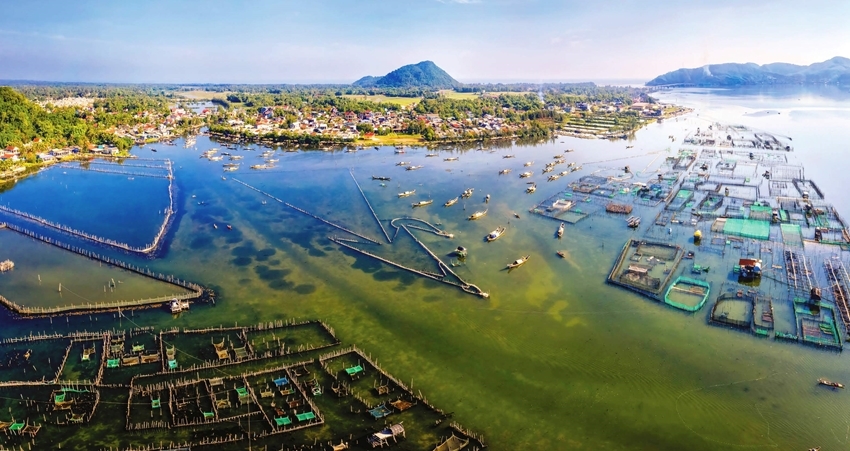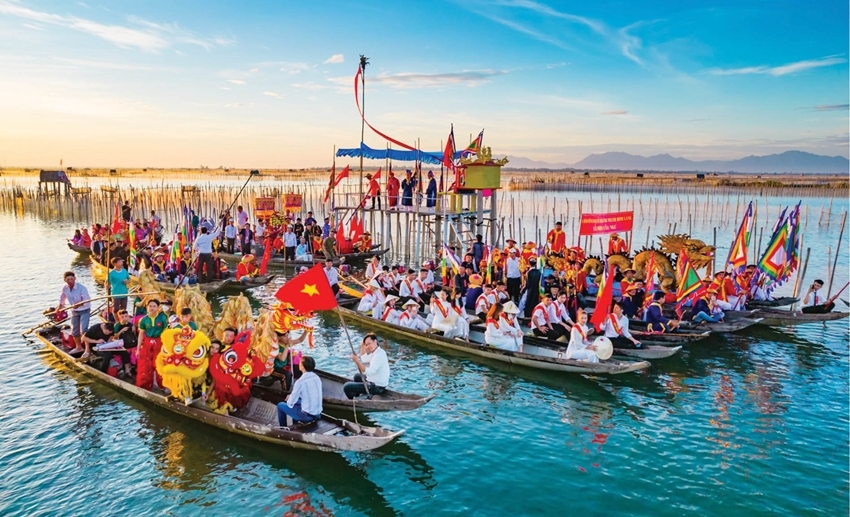According to experts, the beautiful natural scenery, stretching villages, and many special folk festivals in Tam Giang - Cau Hai allow the creation of unique tourism products to be included in tours, making it a highlight for tourism of this region.
 |
| Tam Giang - Cau Hai. Photo: BAO CHAU |
Great potential for tourism development
Surrounding Tam Giang - Cau Hai and An Cu lagoons is a system of more than 100 villages living on agriculture, fishing, and gardening, stretching from the northeast coast to the southeast coast. Among these villages, there are over 20 ones with rich cultural heritage that can be exploited, such as Vinh Xuong, Ke Mon, Dai Loc, Thai Duong Ha, Cu Lai, Ke Sung, Xuan Thien, An Bang, Diem Truong, My Loi, My A, etc.
The folk festivals here are quite special, associated with beliefs, religion, and martial spirit of the river region. Some describe the production scene on the lagoon and wish for luck, peace, and a good harvest. Along with that, people in the lagoon also create many famous traditional products and craft villages.
All of these factors are the premise for researching and organizing various types of tourism associated with exploiting the folk cultural values of the region to serve the diverse needs of tourists, especially the need for experiencing the ecology, agriculture and folk culture attached with traditional craft villages.
Mr. Nguyen Van Phuc, Director of the Department of Tourism, said that two types of tourism associated with folk culture could be proposed to develop the tourism of Tam Giang - Cau Hai. The first one is spiritual tourism, a type of tourism that meets the needs of sightseeing and learning about beliefs and religions through personal and community rituals and traditional festivals of the local community. The second one is cultural experience tourism, which meets the need for exploration of agriculture, fishery, and traditional crafts/villages of tourists, especially young people and residents in urban areas.
 |
| A ritual of residents of Chuon lagoon area within Tam Giang - Cau Hai |
Sharing the same opinion, Dr. Le Vu Truong Giang (Faculty of History - University of Sciences, Hue University) commented that Tam Giang - Cau Hai had great potential for tourism development with two resources being rich folk cultures and indigenous knowledge.
According to Dr. Giang, to develop tourism based on folk culture we need to put a multi-dimensional perspective into consideration, and carry it out at several levels, ranging from the individual organization providing tourism services (including the local community), the destination level, to the tourism service level, which is largely related to sustainable development for the entire lagoon system area.
Harmony of tourism development and conservation
Not stopping at folk religious festivals, Tam Giang - Cau Hai also owns a massive relic system that can be combined into tourism exploitation. Dr. Phan Thanh Hai, Director of the Department of Culture and Sports, said that by 2023, the total number of relics at Tam Giang - Cau Hai would have reached 30, including 1 special national relic, 13 national relics and 16 provincial-level relics. There are also many works put on the protected inventory list, and many unique scenic relics.
In fact, the adoption of many solutions to develop tourism associated with relics at Tam Giang - Cau Hai has brought about significant results. However, after a period of trial operation, the number of tourists taking the tour was negligible. The main reason is due to limitations in destination management and development, and inproper exploitation of existing potentials to form highly competitive unique products. Besides, promotion and advertising practices are not effective and up to par.
To remove those limitations, Dr. Phan Thanh Hai said that it was crucial to foster the participation of the local community in tourism development because they were knowledgeable about the terrain, history, culture, and characteristics of monuments in the area where they lived, and they also created humane values such as customs, festivals, and traditional craft villages, and folk knowledge. In addition, it is necessary to plan and implement a tourism destination development strategy suiting the overall development strategy of Tam Giang - Cau Hai to ensure basic conditions to meet the increasing demands of markets and sustainable development.
“It is necessary to harmonize the relationship between tourism development and the preservation as well as the promotion of the heritage values in the lagoon area. At the same time, it is important to focus on embellishing the landscape, building infrastructure and works to serve tourism so that monuments and landscapes become attractive tourist destinations. Well-organized tourism products not only increase revenue for the tourism industry but also return a part of investment to relics, such as protecting, embellishing, renovating, preserving and promoting heritage values in the lagoon area,” said Dr. Hai.
